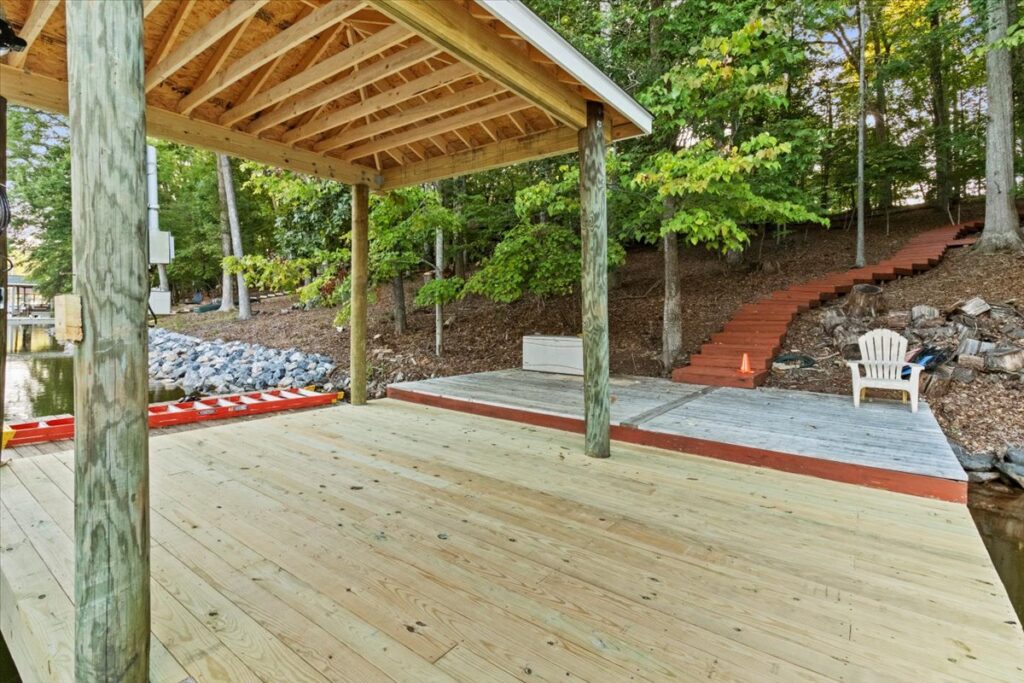Composite vs. Wood Decking at Smith Mountain Lake
When it comes to building a dock or outdoor deck at Smith Mountain Lake, VA, homeowners and business owners face an important decision: wood or composite decking? Both materials offer unique advantages and considerations, particularly in the lakefront environment where exposure to water, sun, and varying temperatures can impact durability and maintenance.
Understanding Your Decking Options
Before diving into the benefits and drawbacks of each material, it’s essential to understand the fundamental differences between wood and composite decking.
Wood Decking
Traditional and time-tested, wood decking is made from natural lumber such as pressure-treated pine, cedar, redwood, or exotic hardwoods like ipe. It offers a classic, warm aesthetic but requires regular maintenance.
Composite Decking
Made from a blend of wood fibers and plastic, composite decking is engineered to resist weathering, moisture, and pests. It mimics the appearance of wood while offering lower maintenance needs.
Pros and Cons of Wood Decking
Pros:
- Natural Beauty: Wood has a warm, authentic look that many homeowners prefer.
- Variety of Options: Different wood species offer varying levels of durability, color, and grain patterns.
- Lower Upfront Cost: Pressure-treated lumber is generally more affordable than composite decking.
- Can Be Refinished: Wood decking can be sanded and stained to restore its original appearance.
Cons:
- High Maintenance: Requires regular staining, sealing, and potential replacement of rotting boards.
- Prone to Weathering: Sun exposure and moisture can lead to warping, splintering, and mold growth.
- Shorter Lifespan: Even with proper care, wood decking may need replacing after 10-20 years.
Pros and Cons of Composite Decking
Pros:
- Low Maintenance: No need for staining, sealing, or sanding—just occasional cleaning.
- Long Lifespan: Composite decking can last 25-50 years, depending on the brand and quality.
- Weather and Pest Resistant: Won’t warp, splinter, or rot due to moisture and is resistant to insects.
- Eco-Friendly: Often made from recycled materials, making it a sustainable choice.
- Consistent Appearance: Available in various colors and textures that remain intact over time.
Cons:
- Higher Initial Cost: Quality composite decking costs more upfront compared to wood.
- Can Retain Heat: Some composite materials can become hot under direct sunlight.
- Limited Refinishing Options: Unlike wood, composite decking cannot be sanded or refinished.
Choosing the Right Decking for Smith Mountain Lake
Since Smith Mountain Lake experiences humid summers, fluctuating temperatures, and year-round exposure to water, choosing a decking material suited for this environment is crucial.
Consider Wood If:
- You love the natural aesthetic and don’t mind regular maintenance.
- You’re working with a tight budget but are willing to invest time in upkeep.
- You plan to refinish or change the deck’s appearance in the future.
Consider Composite If:
- You prefer a long-lasting, low-maintenance solution.
- Your dock or deck is in direct sunlight and exposed to moisture frequently.
- You want an eco-friendly, durable option that withstands harsh lakefront conditions.
Final Thoughts: Making the Best Choice for Your Dock or Deck
Both wood and composite decking have their merits, but the best choice ultimately depends on your budget, aesthetic preference, and long-term maintenance expectations. At Build SML, we specialize in crafting high-quality docks and decks tailored to the unique demands of Smith Mountain Lake. Whether you’re looking for the rustic charm of wood or the modern convenience of composite, we can help bring your vision to life.
